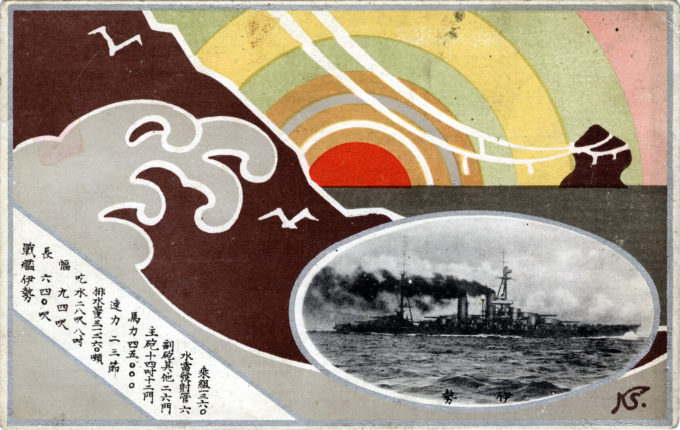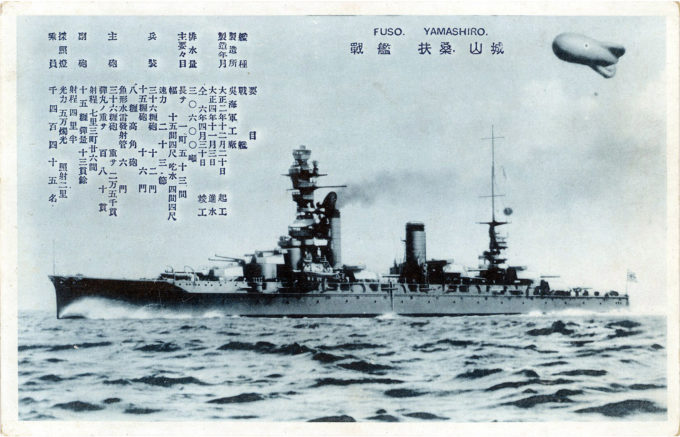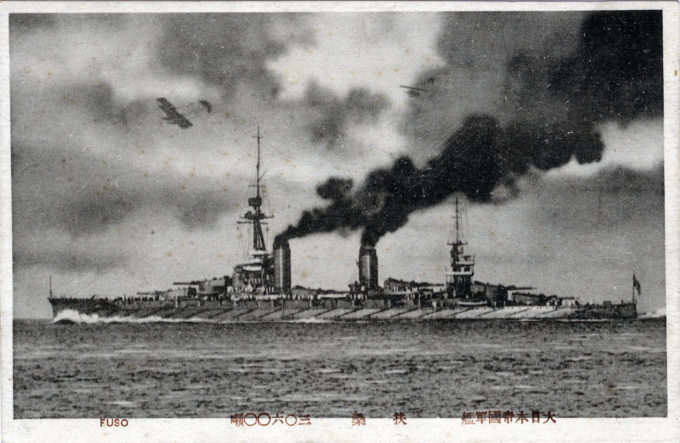
Imperial Japanese Navy battleship Fuso, c. 1920, in its original configuration. A stack would be removed and a “pagoda” mast added to the superstructure during 1930s era modernization.
See also:
I.J.N. battleship Mikasa, c. 1910
Imperial Japanese Navy battleship Nagato, c. 1925
Nakajima E4N2 reconnaissance floatplane, military recruitment postcard, c. 1935.
NAVAL OUTPUT OF JAPANESE SHIPYARDS IN 1914
“The most interesting vessel built in 1914 was the battleship Fuso of 30,600 tons displacement which was launched at the building dock at Kure in March 1914. This vessel which is one of the largest and most powerful battleships afloat carries twelve 14 inch guns in six turrets all arranged on the centerline of the ship. The vessel will go into commission during the latter part of next year.“In addition to the Fuso there are under construction three sister ships, namely the Yamashiro at the Yokosuka Navy Yard, the Hiuga* [sic] at the Mitsubishi Dockyard at Nagasaki, and the Ise* of the Kawasaki Dockyard of Kobe.”
– Journal of the American Society of Naval Engineers, Volume 27, 1915
“The Fuso-class battleships, the Imperial Japanese Navy’s first super-dreadnoughts and the first to be designed and built entirely in Japan, were iconic battleships, with towering pagoda-style bridge structures – a record 144-feet above the waterline – that were added during major reconstruction and rearmament work in the 1930s.
“Both ships in the class, the Fuso and Yamashiro, were armed with twelve 14-inch guns arranged in double-barrel turrets: two forward, two aft and two separated amidships. Launched in 1914 and 1915, respectively, the Yamashiro in 1922 became the first battleship in the IJN to successfully launch aircraft. Both ships were equipped to operate three floatplanes, although no hangar was provided; the Nakajima E4N2 biplane being the first to be deployed but replaced in 1938 by the Nakajima E8N2.
“Fuso was considered the first modern battleship of the Japanese Navy, outclassing her American counterparts of the New York-class in both firepower and speed, and was considered the ‘most powerfully armed battleship in the world’ when completed. But, despite extensive modernization in the 1930s, both battleships were considered obsolescent at the commencement of the Pacific War in 1941.
“Fuso and Yamashiro were the only two Japanese battleships at the Battle of Surigao Strait, the southernmost action of the Battle of Leyte Gulf, and both were lost in the early hours of 25 October 1944 to torpedoes and naval gunfire. Only ten crew members from each ship survived.”
– Wikipedia

Fuso-class battleship, c. 1935. The first battleship class to be built entirely in Japan. When extensively modified in the 1930s, Fuso‘s original tripod mast was replaced by an iconic “pagoda” mast.
* Both the Ise and Hyuga were subsequently constructed as Ise-class battleships, succeeding the Fuso class. Additionally, both received extensive renovation during the Pacific War into hybrid aircraft carrier-battleships.



Pingback: Imperial Japanese Navy Battlecruiser Hiei, 1933. | Old Tokyo
Pingback: Imperial Japanese Navy Battleship Nagato, c. 1925. | Old Tokyo
Pingback: Imperial Japanese Navy battleship “Hyuga”, c. 1920. | Old TokyoOld Tokyo